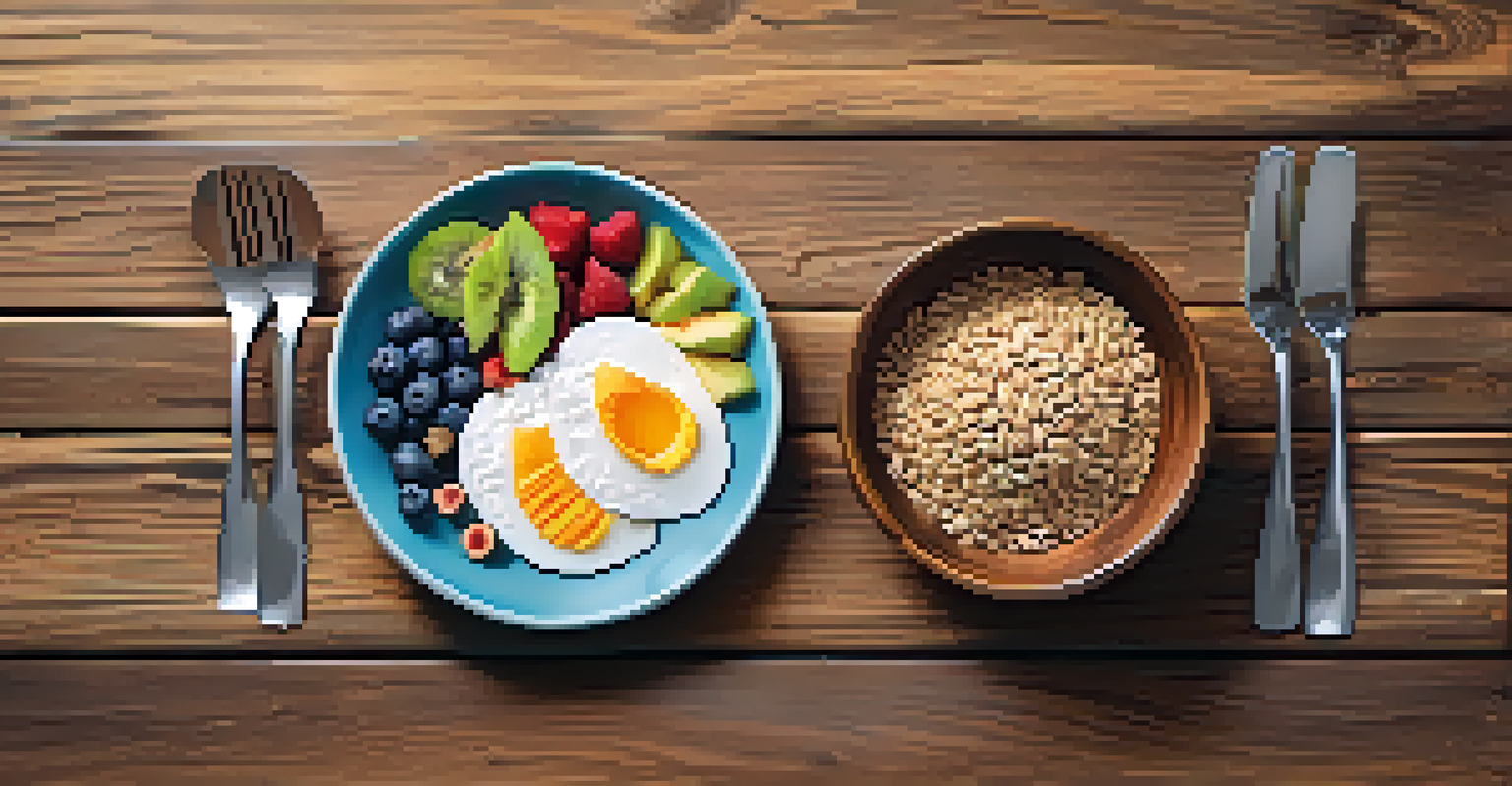Pre-Workout Nutrition: What Martial Artists Need to Know

Understanding the Importance of Pre-Workout Nutrition
Pre-workout nutrition is crucial for martial artists to enhance performance and recovery. Just like a car needs fuel to run smoothly, your body requires the right nutrients to function at its best during training or competition. Without proper nutrition, you might feel sluggish and unable to give your all on the mat.
You are what you eat, so don’t be fast, cheap, easy, or fake.
Eating the right foods before a workout can help provide the energy and focus needed to execute complex techniques and strategies. It’s not just about feeling full; it’s about fueling your body with what it needs to succeed. This foundation can make a significant difference in your training outcomes.
Moreover, understanding how different foods affect your energy levels can empower you to make better choices. With each training session, you can learn what works for you, optimizing your pre-workout meals to elevate your performance.
Key Nutrients for Optimal Performance
When it comes to pre-workout nutrition, three key nutrients stand out: carbohydrates, proteins, and fats. Carbohydrates are your primary source of energy, providing the quick fuel needed for high-intensity activities like martial arts. Think of them as the gas in your tank, propelling you forward.

Proteins play a crucial role in muscle repair and growth, making them essential for martial artists who train regularly. Including a moderate amount of protein in your pre-workout meal can help support your muscles during intense sessions. Meanwhile, healthy fats offer a more sustained energy source, helping you avoid energy crashes.
Fuel Your Body for Performance
Pre-workout nutrition is essential for martial artists to enhance their energy, focus, and overall performance during training.
Balancing these nutrients can help you maintain energy levels throughout your workout. By understanding the roles of each nutrient, you can create a more effective pre-workout meal plan tailored to your specific needs and training goals.
Timing Your Pre-Workout Meal for Best Results
The timing of your pre-workout meal can greatly influence your performance. Ideally, you want to eat about 30 minutes to three hours before training, depending on the size of your meal. A larger meal might require more time to digest, while a small snack might only need a short wait.
The food you eat can be either the safest and most powerful form of medicine or the slowest form of poison.
Eating too close to your workout can lead to discomfort, while waiting too long might leave you feeling depleted. Finding the right balance is key. For example, a light snack like a banana or a handful of nuts can provide a quick energy boost without weighing you down.
Experimenting with timing can help you discover what works best for your body. As you train, pay attention to how your energy levels fluctuate based on when you eat, allowing you to fine-tune your routine for optimal results.
Hydration: A Vital Component of Pre-Workout Prep
Hydration is often overlooked but is a critical part of pre-workout nutrition. Dehydration can lead to decreased performance, fatigue, and even injury, making it essential to drink enough fluids before training. Think of water like the oil in a machine; without it, everything runs less smoothly.
Ideally, you should start hydrating well before your workout. Aim to drink water throughout the day, and increase your intake as you approach your training time. This way, your body is primed and ready to perform at its best.
Timing and Hydration Matter
The timing of your pre-workout meal and proper hydration can significantly impact your performance and energy levels.
In addition to water, some martial artists may benefit from electrolyte-rich drinks, particularly during longer training sessions. These can help replenish lost minerals and keep you feeling strong and focused on the mat.
Choosing the Right Pre-Workout Foods
Selecting the right foods for your pre-workout meal can significantly impact your energy levels and performance. Foods rich in complex carbohydrates, like whole grains and fruits, provide sustained energy without causing a quick spike and crash. For example, oatmeal topped with banana is a fantastic pre-workout option.
Incorporating a source of protein, such as Greek yogurt or a protein shake, can help support muscle maintenance and growth. This combination fuels your body while also providing the necessary nutrients for recovery. It’s like setting up a solid base before building a house.
Experimenting with different food combinations will help you find what works best for you. Everyone's body is different, so pay attention to how specific meals affect your performance during training.
Common Mistakes in Pre-Workout Nutrition
Even the most dedicated martial artists can fall into common pre-workout nutrition traps. One mistake is skipping the meal altogether, thinking that training on an empty stomach will improve fat burn. In reality, this can lead to fatigue and poor performance, leaving you less able to execute techniques effectively.
Another common error is consuming overly heavy or greasy foods right before training. These can lead to discomfort and sluggishness, hindering your ability to perform. Instead, focus on lighter, balanced meals that provide energy without weighing you down.
Tailor Nutrition to Goals
Adapting your pre-workout nutrition based on specific training goals can help you optimize performance and achieve better results.
Finally, neglecting hydration is a mistake many make. Always remember that your body needs sufficient fluids to function optimally, so make hydration a priority in your pre-workout routine.
Adapting Nutrition for Different Training Goals
Your pre-workout nutrition should adapt based on your specific training goals. For example, if your focus is on building strength, you might want to include more protein in your pre-workout meal. On the other hand, if you’re preparing for a competition, your emphasis might shift towards quick-digesting carbohydrates to maximize energy.
Understanding your unique goals allows you to tailor your nutrition to support those objectives. This personalized approach can enhance your training effectiveness, helping you reach your full potential.

Moreover, being flexible with your nutrition can help you navigate different training phases. Whether you’re in a bulking phase or cutting for competition, adjusting your pre-workout meals can be a key factor in achieving success.